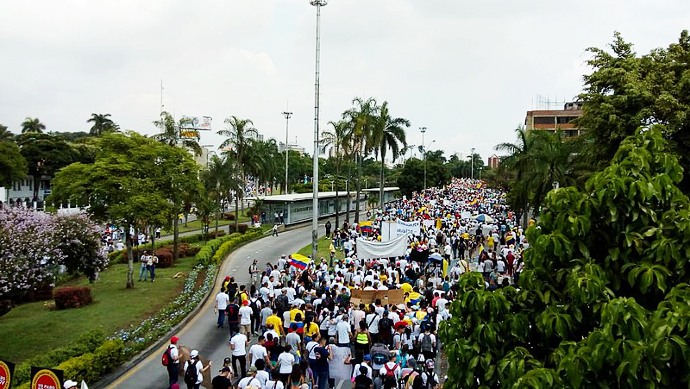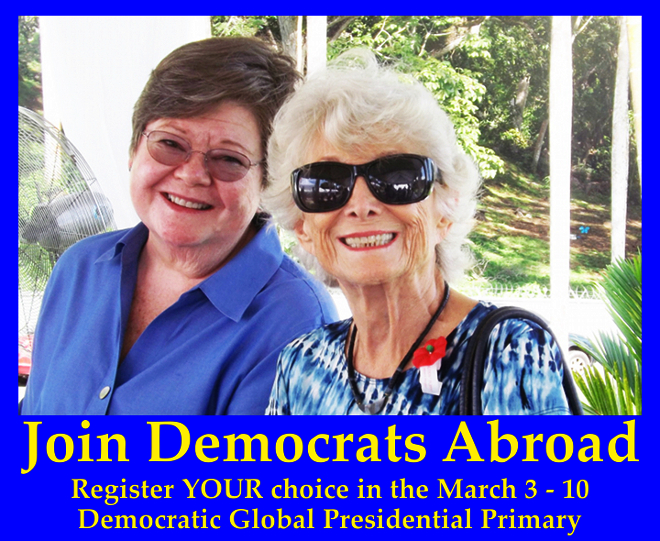November 21, 2019 protest march in Cali. That night police and paramilitary gangs started shooting on the streets. Wikimedia photo by Roboting.
US groups call for respect for peaceful protest,
moratorium on US crowd control weapons to Colombia
by the Washington Office on Latin America (WOLA) and other groups and individuals
December 9 marked the 18th day of peaceful nationwide protests by labor unions, students, peace activists, Afro-Colombians, indigenous, victims, women, farmers negatively impacted by free trade agreements, and many other Colombians. As the demonstrations were launched, US organizations and activists pledged their support to the peaceful protests in a public statement. Days prior to the strike, the Duque administration implemented unnecessary security measures that sent the message that they wanted to squash the protests.
On November 19, the police raided and searched some 37 homes of activists, artists, and alternative media services. Twenty-one of the raids were declared illegal by Colombian courts. In an attempt to justify repression, the President and members of the Democratic Center Party publicly stigmatized the protestors, criminalizing the right to protest and incorrectly stating that there was a foreign influence driving the protests to destabilize the government. Given this initial response from the highest level of government, we felt compelled to speak out against possible attacks and abuses against protestors.
Two weeks later, we sadly see that our concerns were justified. Even though the majority of the hundreds of thousands of Colombians protested peacefully, they were met with a brutal response from the Colombian National Police’s Mobile Anti-Disturbances Squadron (ESMAD, a 3,300-member riot police unit founded in 1999). On November 22, a curfew was issued in both Bogota and Cali due to false rumors spread on social media that thieves—some of them Venezuelans—were taking advantage of the police being busy to attack people’s homes. These rumors caused panic and led to the formation of “para-police” patrolling the streets and fomenting fear and chaos. The government fueled xenophobia against Venezuelans by deporting 60 Venezuelans with no due process.
The next day, Saturday 23, the ESMAD worked methodically and violently to break up any peaceful gathering of protesters, apparently under an order “to disperse any demonstration that might block traffic.” Members of the ESMAD shot 18-year-old Dilan Cruz in the back of the head with a “bean bag” weapon, a “non-lethal” projectile intended, according to UN standards, to “be used in direct fire with the aim of striking the lower abdomen or legs of a violent individual and only with a view to addressing an imminent threat of injury to either a law enforcement official or a member of the public.” Multiple protestors caught the incident on video. Dilan died from his injuries on November 25. The coroner determined that his death was a homicide.
According to the coalition Defendemos la Libertad, made up of 60 organizations working together to conduct observation of social protests, over 400 cases of abuse at the hands of the ESMAD and other police were reported just between November 21 and 27. This includes 16 eye injuries caused by tear gas canisters and other projectiles, which are forbidden by Colombian police procedures and international law to be shot at protesters’ faces.
This is not the first time that actions taken by the ESMAD have resulted in death and injuries. Since its creation in 1999, the unit has killed at least 34 people. Their disproportionate use of force and brutal attacks against unarmed civilians in rural protests—especially those led by indigenous communities—have been denounced to authorities on numerous occasions.
To our knowledge, US public funds do not fund the ESMAD directly. However, many of the ESMAD’s weapons, including tear gas and “bean bags,” are purchased with the Colombian government’s own funds through US arms sales programs. Much of its materiel, for instance, comes from one Pennsylvania-based company, Combined Systems, Inc., which sells tear gas canisters and stun grenades to Colombia. We call on the State Department and the US Congress to place a moratorium on sales of crowd control weapons to Colombia until the ESMAD has either been replaced by a new force or undergone a full overhaul toward building a dramatically different, more rights-respecting culture and doctrine based on de-escalation, respect for peaceful protest, and minimal use of force. The US Embassy and State Department should support civil society’s rightful demands for peace, labor rights, safety for human rights defenders, and environmental protection. The Secretary of State’s reiteration of rumors that widespread social protests across the Americas are driven by Venezuelan and Cuban intervention rather than the real national concerns that lead people to protest in each country, including Colombia, is harmful.
Lastly, we call on the Duque administration to resolve these protests peacefully through a negotiation involving the broad leadership of the various sectors involved in the protests that leads to a deeper resolution of the issues driving this widespread social discontent. A thorough investigation of the killing of Dilan Cruz and other abuses taking place during the protests should be carried out in civilian courts. The Inspector General’s office (Procuraduria General de la Nación) and the Ombudsman’s Office (Defensoría del Pueblo) should be encouraged and permitted to play their crucial roles in issuing disciplinary measures for public officials and verifying and documenting citizen complaints. Finally, the Duque administration should ensure that the existing protocol for addressing social protest (Resolution 1190 of 2018 of the Ministry of the Interior) is employed at all times instead of completely ignoring it.
Sincerely,
Washington Office on Latin America (WOLA)
Witness for Peace Solidarity Collective
United Church of Christ, Justice and Witness Ministries
UNIAFRO
The International Institute on Race, Equality, and Human Rights
OXFAM America
Movement for Peace in Colombia, New York
MADRE
Latin America Working Group (LAWG)
Latin American Studies Association (LASA) – Colombia Section
Interdisciplinary Colombian Studies at University of New Mexico
Global Ministries of the Christian Church (Disciples of Christ) and the United Church of Christ
Colombia Human Rights Committee, Washington, DC
Colombia Grassroots Support, New Jersey.
Codhes
CIVICUS: World Alliance for Citizen Participation
Chicago Religious Leadership Network on Latin America
Center for Justice & International Law (CEJIL)
Amazon Watch
AFRODES USA
ACSN
Victoria Sanford, PhD – Director, Center for Human Rights & Peace Studies, Lehman College-NY
Sinclair Thomson – New York University-NY
Sandra Granobles – DC Government Educator
Ofunshi Oba Koso, Minnesota Yoruba Cuba Association- MN
Nicolás Sánchez – Department of Latin American Studies, Duke University
Nancy Appelbaum – Director, Latin American and Caribbean Area Studies Program, Binghamton University-NY
Michael Birenbaum Quintero – Chair, Musicology and Ethnomusicology Department, Boston University
Mary Roldán – Epstein Professor of Latin American History Hunter College, CUNY-NY
Margaret Powrer – Profesor of History, Illinois Institute of Technology
Luz M Betancourt, PhD., CUNY, Graduate Center-NY
Lirio Gutiérrez Rivera – Universidad Nacional de Colombia-Colombia
Lina Britto – Assistant Professor, Northwestern University- IL
Kiran Asher – Professor, University of Massachusetts-MA
Jonathan Fox – Professor, School of International Service, American University-DC
John C. Dugas – Kalamazoo College-MI
Joel Wolfe – Professor of History, University of Massachusetts
Jessica Srikantia, Associate Professor at George Mason University’s Schar School of Policy and Government-VA
James E. Sanders – Utah State University-UT
Gloria Monroy-DC
Gina McDaniel Tarver – Associate Professor of Art History, Texas State University-TX
Gabriel Rudas-Burgos – Professor of Hispanic Languages and Literatures, Stony Brook University
Felipe Gómez G – Professor, Carnegie Mellon University-PA
Fabian Prieto-Ñañez – Postdoctoral Researcher, Virginia Tech-VA
Erin K. McFee, PhD – The University of Chicago-IL
Danesis Arce – Afromedios
Constanza López – Associate Professor, University of North Florida-FL
Barbara Gerlach – Minister, United Church of Christ
Alexander Fattal – Assistant Professor, University of California, San Diego-CA

Contact us by email at fund4thepanamanews@gmail.com
These links are interactive — click on the boxes












